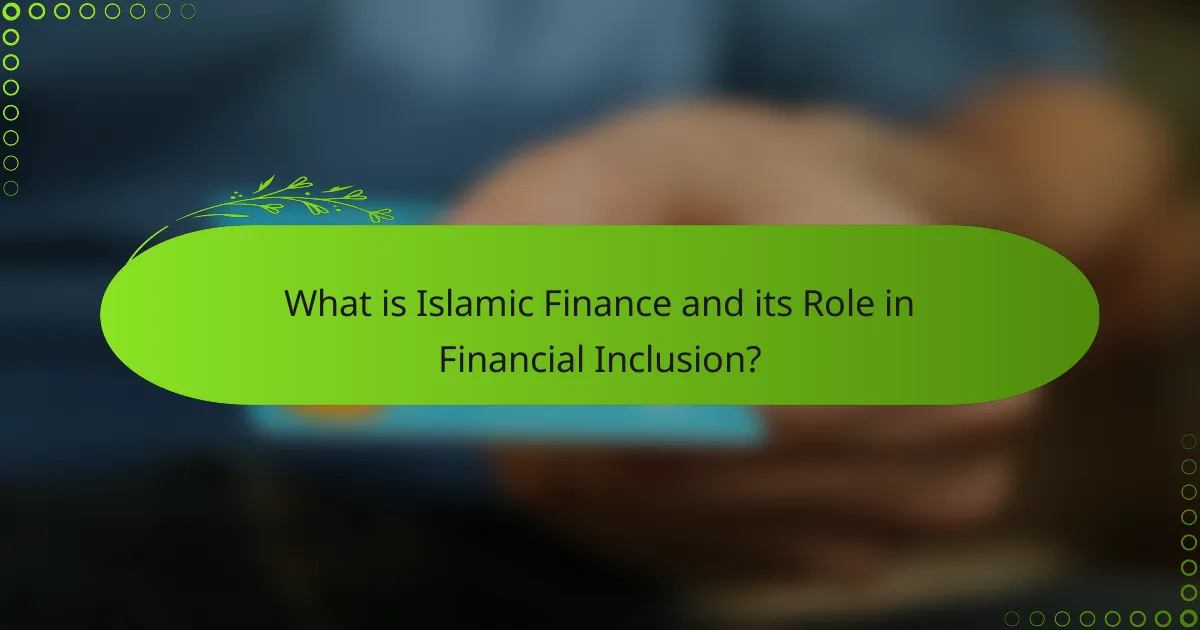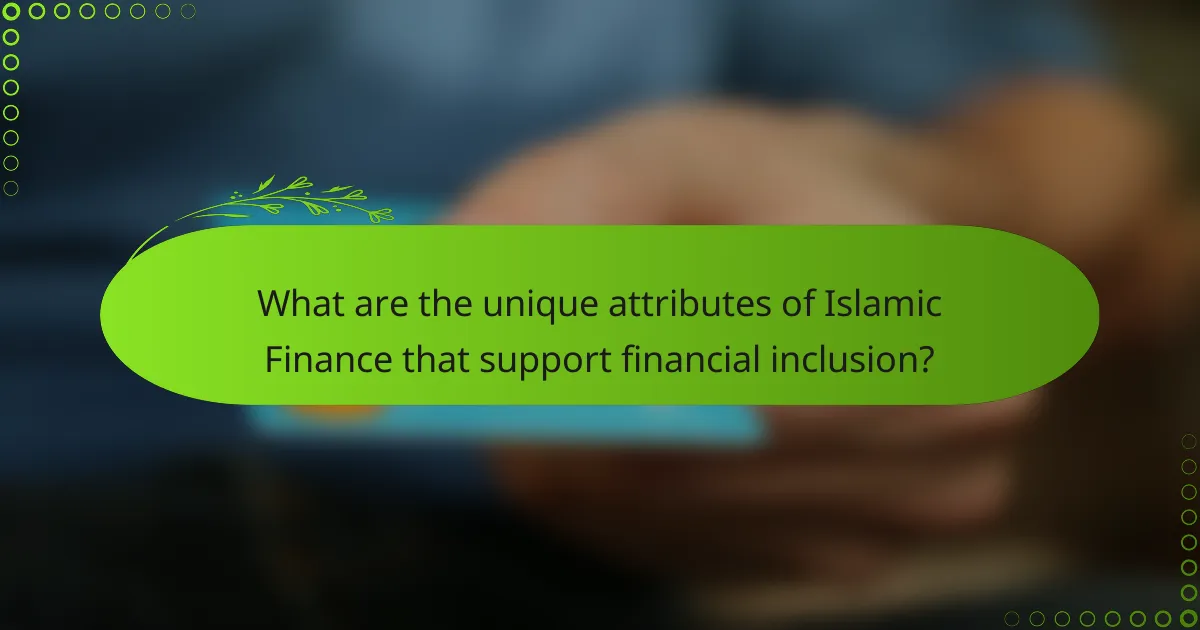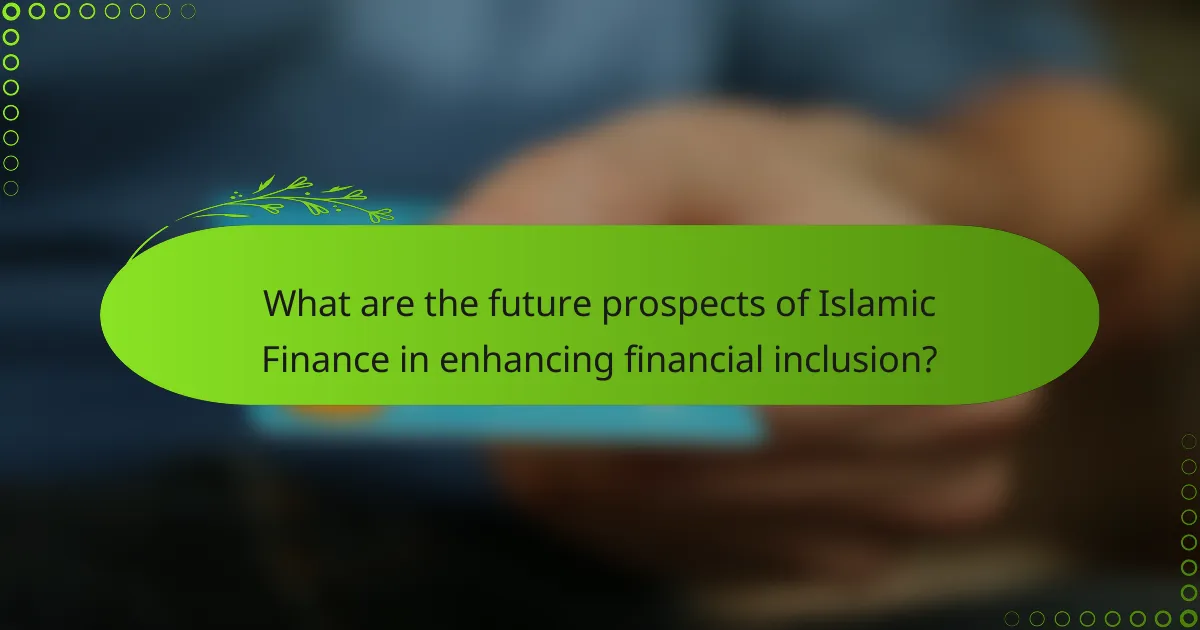
What is Islamic Finance and its Role in Financial Inclusion?
Islamic finance is a financial system that operates in accordance with Islamic law (Sharia). It prohibits interest (riba) and promotes risk-sharing and ethical investments. Islamic finance plays a crucial role in financial inclusion by providing access to financial services for underserved populations. It offers products like microfinance and profit-sharing investments tailored to the needs of low-income individuals. According to the Islamic Financial Services Board, the global Islamic finance market was valued at over $2 trillion in 2021, indicating its significant growth. This financial system encourages social welfare and economic development, aligning with the principles of justice and fairness. By offering Sharia-compliant financial products, Islamic finance helps bridge the gap for those excluded from traditional banking systems.
How does Islamic Finance differ from conventional finance?
Islamic finance differs from conventional finance primarily in its adherence to Sharia law. Sharia prohibits interest (riba), which is a fundamental aspect of conventional finance. Instead, Islamic finance promotes profit-sharing and risk-sharing arrangements. For example, in Islamic finance, investments must be made in ethical and socially responsible ventures. This contrasts with conventional finance, where investments can include industries like alcohol or gambling. Additionally, Islamic finance emphasizes asset-backed financing, ensuring that transactions are linked to tangible assets. This approach reduces speculation and promotes stability. Overall, Islamic finance aims to create a more equitable financial system aligned with ethical principles.
What are the key principles of Islamic Finance?
The key principles of Islamic Finance include the prohibition of riba, risk-sharing, and ethical investments. Riba refers to interest, which is strictly forbidden in Islamic finance. This principle aims to promote fairness and justice in financial transactions. Risk-sharing emphasizes that all parties involved in a financial agreement share the risks and rewards. This encourages partnership and collaboration. Ethical investments require that financial activities adhere to Sharia law. Investments must avoid businesses that deal with alcohol, gambling, or other prohibited activities. These principles collectively aim to create a more equitable financial system. They support financial inclusion by providing access to financial services aligned with Islamic values.
Why is risk-sharing important in Islamic Finance?
Risk-sharing is important in Islamic Finance because it aligns with the principles of justice and equity. Islamic Finance prohibits interest-based transactions, promoting risk-sharing as a fair alternative. This approach helps distribute profits and losses among parties involved. It fosters collaboration and mutual responsibility. By encouraging partnerships, risk-sharing enhances financial inclusion. It allows individuals and businesses to access capital without the burden of debt. Furthermore, it promotes ethical investments that support community development. Overall, risk-sharing contributes to a more equitable financial system.
What challenges does Islamic Finance address in financial inclusion?
Islamic Finance addresses several challenges in financial inclusion. It provides ethical financing options that comply with Sharia law. This approach helps to engage unbanked populations who may avoid conventional banking due to interest-based practices. Islamic Finance also promotes risk-sharing rather than risk transfer, fostering a more inclusive economic environment. Additionally, it offers products tailored for low-income individuals, such as microfinance initiatives. These initiatives often lack collateral requirements, making them accessible to marginalized groups. Furthermore, Islamic Finance encourages community investment and development, which drives local economic growth. By addressing these challenges, Islamic Finance enhances overall financial inclusion.
How does Islamic Finance promote access to financial services?
Islamic Finance promotes access to financial services by adhering to principles that encourage ethical investment and risk-sharing. It prohibits interest (riba), which makes financial products more accessible to those who might be excluded from conventional banking. By offering profit-and-loss sharing arrangements, Islamic Finance allows individuals to participate in economic activities without the burden of debt.
Moreover, Islamic financial institutions often focus on underserved populations, providing microfinance solutions that cater to low-income individuals. According to a report by the Islamic Financial Services Board, the global Islamic finance industry reached $2.88 trillion in 2020, indicating its growing role in financial inclusion.
Thus, Islamic Finance creates a more inclusive financial ecosystem by offering alternatives that align with the values and needs of diverse communities.
What role does microfinance play in Islamic Finance?
Microfinance plays a crucial role in Islamic Finance by providing financial services to underserved populations. It aligns with Islamic principles by avoiding interest (riba) and promoting profit-sharing models. These models include mudarabah (profit-sharing) and musharakah (joint venture), which encourage entrepreneurship. Microfinance institutions (MFIs) operating under Islamic Finance principles help empower low-income individuals. They enable access to capital for small businesses, fostering economic growth. This approach enhances financial inclusion by integrating marginalized communities into the financial system. According to a report by the Islamic Financial Services Board, microfinance can significantly reduce poverty levels in Muslim-majority countries.
How effective is Islamic Finance in enhancing financial inclusion?
Islamic Finance is highly effective in enhancing financial inclusion. It provides ethical financial products that comply with Sharia law. This approach appeals to individuals who avoid conventional banking due to religious beliefs. In countries with significant Muslim populations, Islamic Finance has expanded access to banking services. According to the Islamic Financial Services Board, the global Islamic finance market reached $2.88 trillion in 2021. This growth indicates increasing participation in financial systems. Additionally, Islamic microfinance initiatives have successfully supported low-income individuals. These initiatives often provide interest-free loans, fostering entrepreneurship and economic empowerment.
What statistics support the impact of Islamic Finance on financial inclusion?
Islamic Finance significantly enhances financial inclusion. According to the Islamic Financial Services Board, as of 2021, the global Islamic finance market reached approximately $2.88 trillion. This growth supports access to financial services for underserved populations. In countries like Indonesia and Malaysia, Islamic finance institutions have increased access to banking services for millions. The World Bank reported that Islamic microfinance has reached over 7 million clients globally. Additionally, a study by the Qatar Financial Centre found that Islamic finance promotes financial literacy, which is crucial for inclusion. These statistics illustrate the positive impact of Islamic finance on expanding financial access.
Which regions have seen the greatest benefits from Islamic Finance?
Southeast Asia and the Middle East have seen the greatest benefits from Islamic Finance. Countries like Malaysia and Indonesia have developed robust Islamic banking sectors. These nations report increased financial inclusion through Sharia-compliant products. The Middle East, particularly the Gulf Cooperation Council (GCC) countries, has also benefited significantly. They have seen a rise in Islamic financial institutions and investment opportunities. According to the Islamic Financial Services Board, the global Islamic finance market reached $2.88 trillion in 2020. This growth is largely driven by these regions’ adherence to Sharia principles.

What are the unique attributes of Islamic Finance that support financial inclusion?
Islamic Finance has unique attributes that support financial inclusion. These attributes include risk-sharing, ethical investment principles, and prohibition of interest (riba). Risk-sharing allows participants to share profits and losses, making financing more accessible to those without collateral. Ethical investment principles ensure that funds are directed towards socially responsible projects. The prohibition of interest eliminates barriers for those who cannot afford conventional loans. Additionally, Islamic Finance promotes microfinance initiatives, which cater to underserved populations. These initiatives help empower individuals and small businesses. By aligning financial practices with social values, Islamic Finance fosters a more inclusive economic environment.
How do Sharia-compliant products facilitate financial inclusion?
Sharia-compliant products facilitate financial inclusion by providing access to financial services that align with Islamic law. These products avoid interest-based transactions, making them accessible to Muslims who may otherwise avoid conventional banking. They offer profit-sharing models, which can empower individuals and small businesses. For example, Islamic microfinance programs provide small loans without interest, helping low-income individuals start businesses. According to a report by the Islamic Financial Services Board, Sharia-compliant finance has grown significantly, reaching $2.88 trillion in assets globally. This growth indicates a rising acceptance and demand for these products, enhancing financial inclusion for underserved populations.
What types of financial products are offered under Islamic Finance?
Islamic finance offers several types of financial products that comply with Sharia law. These products include Murabaha, which is a cost-plus financing structure. Another product is Mudarabah, a profit-sharing investment partnership. Musharakah is also common, involving joint venture financing. Ijarah refers to leasing agreements under Islamic finance. Sukuk are Islamic bonds that represent ownership in assets. Takaful is a cooperative insurance model that spreads risk among participants. Each of these products avoids interest (riba) and promotes ethical investment, aligning with Islamic principles.
How do these products cater to underserved populations?
Islamic finance products cater to underserved populations by providing interest-free financing options. These products align with Islamic principles, which prohibit riba (interest). They promote financial inclusion by offering accessible financial services to those excluded from conventional banking. For example, microfinance initiatives in Islamic finance allow small businesses to thrive without incurring debt. Additionally, profit-sharing models in Islamic finance empower communities by sharing risks and rewards. According to a report by the Islamic Financial Services Board, Islamic finance has reached millions of unbanked individuals globally. This approach addresses the unique needs of underserved populations, fostering economic growth and stability.
What are the success stories of Islamic Finance in promoting financial inclusion?
Islamic finance has successfully promoted financial inclusion through various initiatives. One notable success story is the establishment of microfinance institutions based on Islamic principles. These institutions provide interest-free loans to underserved populations. For example, the Grameen Bank in Bangladesh operates under Islamic financing principles. It has empowered millions of women by providing them access to capital.
Another success story is the use of Sukuk, or Islamic bonds, to fund infrastructure projects. These projects create jobs and stimulate local economies. In Malaysia, Sukuk has been instrumental in financing affordable housing initiatives. This effort has increased home ownership among low-income families.
Additionally, Islamic banking products tailored for small and medium enterprises (SMEs) have enhanced access to finance. In countries like Indonesia, Islamic banks offer profit-sharing arrangements to SMEs. This approach mitigates risk for entrepreneurs and encourages business growth.
Furthermore, mobile banking solutions in Islamic finance have expanded access to financial services. In countries such as Kenya, Sharia-compliant mobile banking apps allow users to save and transfer money easily. This innovation has reached rural areas where traditional banking services are limited.
Overall, these examples illustrate how Islamic finance effectively promotes financial inclusion by providing accessible financial products and services to marginalized communities.
Which organizations have successfully implemented Islamic Finance solutions?
Several organizations have successfully implemented Islamic Finance solutions. Notable examples include the Islamic Development Bank (IsDB), which promotes economic development through Sharia-compliant financing. Another example is Abu Dhabi Islamic Bank, offering a range of Islamic banking products. Qatar Islamic Bank has also been influential in the sector, providing various financial services aligned with Islamic principles. Additionally, Al Baraka Banking Group operates in multiple countries, facilitating Islamic finance solutions globally. Each of these organizations demonstrates effective implementation of Islamic finance, contributing to financial inclusion in their respective regions.
What lessons can be learned from these success stories?
Success stories in Islamic finance demonstrate the importance of ethical practices. They highlight that financial products can be both profitable and socially responsible. Effective community engagement is crucial for understanding local needs. Tailoring financial solutions to cultural contexts enhances acceptance and usage. Collaboration with local institutions can strengthen trust and outreach. Education on financial literacy is essential for empowering individuals. Finally, measurable impact assessments help in refining strategies for greater inclusion. These lessons underscore the potential of Islamic finance to address financial exclusion effectively.

What are the future prospects of Islamic Finance in enhancing financial inclusion?
Islamic finance has significant future prospects in enhancing financial inclusion. Its principles promote equitable distribution of wealth and risk-sharing. This aligns with the needs of underserved populations. The global Muslim population exceeds 1.9 billion, representing a vast potential market. Islamic finance can attract those who prefer Sharia-compliant products. Additionally, innovative fintech solutions are emerging within Islamic finance. These solutions can improve access to financial services. Reports indicate that Islamic fintech is projected to grow significantly in the coming years. For example, the Islamic Fintech Report 2021 estimates a market potential of $3 trillion. This growth can facilitate access to banking for the unbanked. Overall, Islamic finance is positioned to play a crucial role in achieving broader financial inclusion.
How can technology play a role in the growth of Islamic Finance?
Technology can significantly enhance the growth of Islamic finance by improving accessibility and efficiency. Digital platforms enable easier access to Sharia-compliant financial products. Mobile banking applications allow users to manage their finances in accordance with Islamic principles. Blockchain technology can enhance transparency and security in transactions, aligning with Islamic finance’s ethical standards. Moreover, fintech innovations facilitate peer-to-peer lending and crowdfunding, broadening investment opportunities. According to a report by PwC, the Islamic fintech sector is projected to reach $128 billion by 2025. This growth is driven by increased smartphone [censured] in Muslim-majority countries. Thus, technology not only supports compliance with Islamic laws but also fosters financial inclusion.
What innovations are emerging in the Islamic Finance sector?
Innovations in the Islamic Finance sector include fintech solutions, green sukuk, and blockchain technology. Fintech solutions enhance accessibility and streamline transactions. These platforms often cater to unbanked populations, promoting financial inclusion. Green sukuk, or Islamic bonds, fund environmentally sustainable projects. This aligns with Shariah principles while attracting socially responsible investors. Blockchain technology increases transparency and efficiency in transactions. It also helps in reducing costs associated with traditional banking. These innovations collectively aim to broaden access to financial services in line with Islamic principles.
How can digital platforms enhance access to Islamic financial products?
Digital platforms can enhance access to Islamic financial products by providing streamlined services and wider outreach. These platforms facilitate online transactions, making it easier for users to access products from anywhere. They often offer user-friendly interfaces that simplify the process of understanding and applying for Islamic financial products. Additionally, digital platforms can provide educational resources about Islamic finance, increasing awareness and understanding among potential customers. Research indicates that mobile banking and fintech solutions have significantly improved financial inclusion in regions with limited access to traditional banking. For example, a report by the World Bank shows that digital financial services can reduce barriers to access, particularly in developing countries.
What best practices can be adopted to maximize the impact of Islamic Finance on financial inclusion?
To maximize the impact of Islamic Finance on financial inclusion, adopting risk-sharing models is essential. These models promote equitable distribution of financial risks and rewards. By utilizing profit-and-loss sharing arrangements, Islamic Finance can engage underserved populations effectively. Additionally, enhancing financial literacy among potential clients is crucial. Educating individuals about Islamic financial products fosters trust and understanding.
Integrating technology into Islamic Finance can also expand access. Digital platforms can lower transaction costs and improve service delivery. Furthermore, developing Sharia-compliant microfinance products addresses the needs of low-income individuals. Research indicates that microfinance has significantly improved access to finance in many Muslim-majority countries.
Collaborating with local communities ensures that financial products meet specific needs. This localized approach can lead to better adoption rates among target populations. Establishing partnerships with non-governmental organizations can also enhance outreach efforts. These best practices collectively strengthen the role of Islamic Finance in promoting financial inclusion.
How can stakeholders collaborate to improve Islamic Finance offerings?
Stakeholders can collaborate to improve Islamic Finance offerings by creating partnerships across sectors. Financial institutions, regulatory bodies, and educational entities must work together. They can develop shared frameworks that align Islamic Finance with global standards. Joint initiatives can enhance product innovation tailored to diverse market needs. Stakeholders should also engage in knowledge-sharing platforms for best practices. Collaborative research can identify gaps in current offerings and consumer needs. Regular stakeholder forums can facilitate ongoing dialogue and feedback. This collaborative approach can ultimately enhance financial inclusion in the Islamic Finance sector.
What strategies can be employed to educate communities about Islamic Finance?
Community education about Islamic Finance can be achieved through various strategies. Workshops and seminars can provide direct engagement and knowledge sharing. Collaborating with local mosques ensures the message reaches a relevant audience. Educational materials, such as brochures and online resources, can offer accessible information. Incorporating Islamic Finance into school curricula promotes early understanding. Utilizing social media platforms allows for broader outreach and engagement. Partnering with financial institutions can enhance credibility and provide practical insights. Conducting research and sharing case studies demonstrates real-world applications and benefits. These strategies collectively foster a better understanding of Islamic Finance within communities.
Islamic finance is a financial system operating in accordance with Islamic law (Sharia), focusing on ethical investments and risk-sharing while prohibiting interest (riba). This article explores the role of Islamic finance in enhancing financial inclusion, highlighting its unique attributes such as microfinance products tailored for low-income individuals, which provide access to financial services for underserved populations. Additionally, it examines the key principles of Islamic finance, its differences from conventional finance, and the impact of technology and innovative practices on expanding access to Sharia-compliant financial products. The article also presents success stories and strategies for improving financial literacy and community engagement to further promote financial inclusion through Islamic finance.